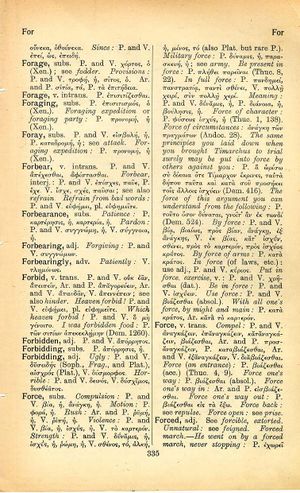force
νύμφην τ' ἄνυμφον παρθένον τ' ἀπάρθενον → wife unwed and virgin that is no virgin | bride that is no bride, virgin that is virgin no more | virgin wife and widowed maid | unwed bride and ravished virgin
English > Greek (Woodhouse)
subs.
Compulsion: P. and V. βία, ἡ, ἀνάγκη, ἡ. Motion: P. φορά, ἡ. Rush: Ar. and P. ῥυμή, ἡ, V. ῥιπή, ἡ. Violence: P. and V. βία, ἡ, ἰσχύς, ἡ, V. τὸ καρτερόν. Strength: P. and V. δύναμις, ἡ, ἰσχύς, ἡ. ῥώμη, ἡ, V. σθένος, τό, ἀλκή, ἡ, μένος, τό (also Plat. but rare P.). Military force: P. δύναμις, ἡ, παρασκευή, ἡ; see army. Be present in force: P. πλήθει παρεῖναι (Thuc. 8, 22). In full force: P. πανδημεί, πανστρατίᾳ, παντὶ σθένει, V. πολλῇ χειρί, σὺν πολλῇ χερί. Meaning: P. and V. δύναμις, ἡ, P. διάνοια, ἡ, βούλησις, ἡ. Force of character: P. φύσεως ἰσχύς. ἡ (Thuc. 1, 138). Force of circumstances: ἀνάγκη τῶν πραγμάτων (Andoc. 28). The same principles you laid down when you brought Timarchus to trial surely may be put into force by others against you: P. ἃ ὡρίσω σὺ δίκαια ὅτε Τίμαρχον ἔκρινες, ταὐτὰ δήπου ταῦτα καὶ κατὰ σοῦ προσήκει τοῖς ἄλλοις ἰσχύειν (Dem. 416). The force of this argument you can understand from the following: P. τοῦτο ὅσον δύναται, γνοῖτʼ ἂν ἐκ τωνδί (Dem. 524). By force: P. and V. βίᾳ, βιαίως, πρὸς βίαν, ἀνάγκῃ, ἐξ ἀνάγκης, V. ἐκ βίας, κατʼ ἰσχύν, σθένει, πρὸς τὸ καρτερόν, πρὸς ἰσχύος κράτος. By force of arms: P. κατὰ κράτος. In force (of laws, etc.); use adj., P. and V. κύριος. Put in force, exercise, v.: P. and V. χρῆσθαι (dat.). Be in force: P. and V. ἰσχύειν. Use force: P. and V. βιάζεσθαι (absol.). With all one's force, by might and main: P. κατὰ κράτος, Ar. κατὰ τὸ καρτερόν. v. trans. Compel: P. and V. ἀναγκάζειν, ἐπαναγκάζειν, καταναγκάζειν, βιάζεσθαι, Ar. and P. προσαναγκάζειν, P. καταβιάζεσθαι, Ar. and V. ἐξαναγκάζειν, V. διαβιάζεσθαι. Force (an entrance): P. βιάζεσθαι (acc.) (Thuc. 4, 9). Force one's way: P. βιάζεσθαι (absol.). Force one's way in: Ar. and P. εἰσβιάζεσθαι. Force one's way out: P. βιάζεσθαι εἰς τὰ ἔξω. Force back: see repulse. Force open: see prise.

